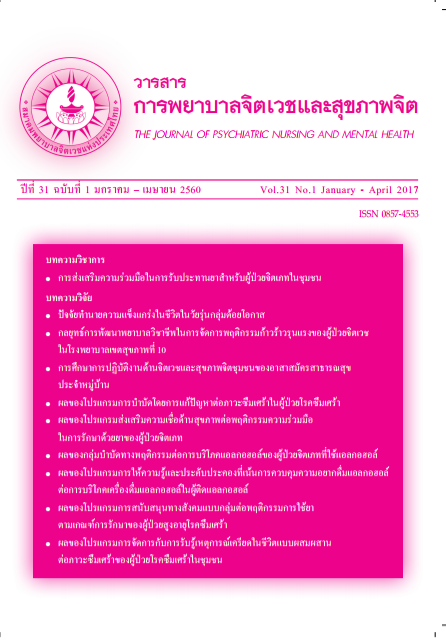ผลของโปรแกรมการสนับสนุนทางสังคมแบบกลุ่มต่อพฤติกรรมการใช้ยา ตามเกณฑ์การรักษาของผู้ป่วยสูงอายุโรคซึมเศร้า* THE EFFECT OF GROUP SOCIAL SUPPORT PROGRAM ON MEDICATION ADHERENCE OF ELDERLY PATIENTS WITH MAJOR DEPRESSIVE DISORDER
Main Article Content
บทคัดย่อ
Abstract
Objective: The purpose of this quasi experimental research was to examine medication adherence of elderly patients with depression age over 60-year-old who received group social support.
Methods: The sample included forty elderly patients who were diagnosed with depressive disorder at the outpatient department. The samples were matched pair and randomly assigned into the experimental and the control group, 20 in each group. Social support program developed based on the concept of social support postulated by House (1981) which have 4 components:1) Emotional Support, 2) Appraisal Support, 3) Information Support, and 4) Instrumental Support using the group process of Marram (1978). The research instruments were 1) Demographic questionnaire, 2) MMSEThai 2002, 3) Medication Adherence Rating Scale and 4) Social Support Assessment. The descriptive statistics and t-test were used for data analysis.
Results: Major findings were as follows: 1. The medication adherence score of elderly patients with depression after receiving group social support was significantly higher than before receiving the program. (p <.05) 2. The medication adherence score of elderly patients with depression who received group social support was significantly higher than those who received the regular nursing care. (p <.05)
บทคัดย่อ
วัตถุประสงค์: การวิจัยกึ่งทดลองนี้มี วัตถุประสงค์เพื่อศึกษาพฤติกรรมการใช้ยาตามเกณฑ์การรักษาของผู้ป่วยสูงอายุโรคซึมเศร้าที่ได้รับการสนับสนุนทางสังคมแบบกลุ่ม
วิธีการศึกษา: กลุ่มตัวอย่าง คือ ผู้ป่วยโรคซึมเศร้าอายุ 60 ปีขึ้นไป แผนกผู้ป่วยนอกจำนวน 40 คน ได้รับการจับคู่แล้วสุ่มเข้ากลุ่มทดลองและกลุ่มควบคุมกลุ่มละ 20 คน ผู้วิจัยพัฒนาเนื้อหาการสนับสนุนทางสังคมแบบกลุ่มจากแนวคิดการสนับสนุนทางสังคมของ House (1981) โดยมีองค์ประกอบ 4 ด้านได้แก่ 1) การสนับสนุนด้านอารมณ์ 2) การสนับสนุนด้านการประเมินค่า 3) การสนับสนุนด้านข้อมูลข่าวสาร และ 4) การสนับสนุนด้านทรัพยากรในการพัฒนาเนื้อหา/สาระของแต่ละกิจกรรมและกระบวนการดำเนินกลุ่มของMarram (1978) เครื่องมือในการวิจัยประกอบด้วย1) แบบสอบถามข้อมูลส่วนบุคคล 2) แบบทดสอบสภาพสมองเบื้องต้นฉบับภาษาไทย 3) แบบประเมินพฤติกรรมการรับประทานยาและ 4) แบบประเมินการสนับสนุนทางสังคมวิเคราะห์ข้อมูลโดยใช้สถิติเชิงพรรณนา และสถิติที
ผลการศึกษา: ผลการวิจัยสรุปได้ดังนี้
1. พฤติกรรมการใช้ยาตามเกณฑ์การรักษาของผู้สูงอายุโรคซึมเศร้าหลังได้รับโปรแกรมการสนับสนุนทางสังคมสูงกว่าก่อนได้รับโปรแกรมฯ อย่างมีนัยสำคัญทางสถิติที่ระดับ .05
2. หลังการทดลองพฤติกรรมการใช้ยาตามเกณฑ์การรักษาของผู้สูงอายุโรคซึมเศร้ากลุ่มที่ได้รับโปรแกรมฯ สูงกว่ากลุ่มที่ได้รับการพยาบาลตามปกติอย่างมีนัยสำคัญทางสถิติที่ระดับ .05
Article Details
บทความที่ได้รับการตีพิมพ์แล้ว เป็นลิขสิทธิ์ของสมาคมพยาบาลจิตเวชแห่งประเทศไทย


